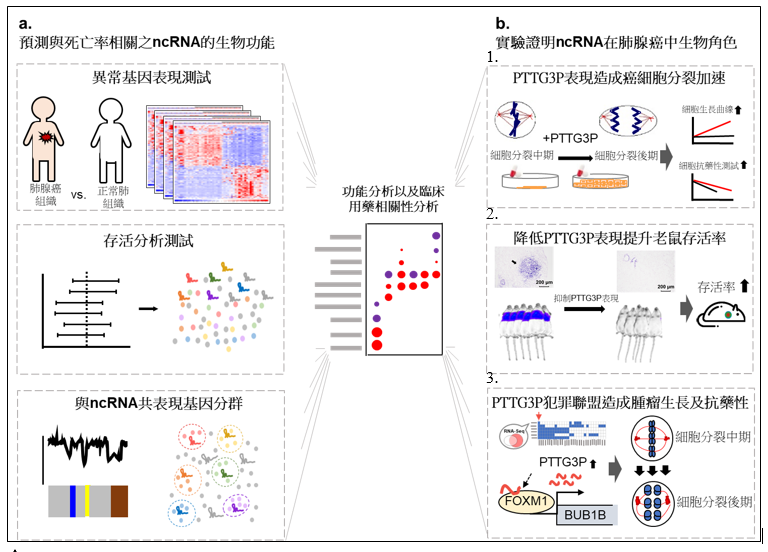Date: 2020-02-20
There is only one-third of total human transcripts annotated as coding RNAs, which translate into protein products to pursue biological functions; on the other hand, the rest of two-third is noncoding RNAs (ncRNAs), which were generally considered as junk genes due to lacking the potential of protein translation. Nevertheless, there are more and more studies shed the light on the importance of ncRNAs in disease progression and patient outcomes. The hurdles for studying ncRNAs associated with diseases and cancers are lacking effective ways to systematically identify disease-associated ncRNAs for exploring their molecular and pathological functions for clinical interventions.
Postdoctoral researcher Dr. Jou-Ho Shih, in Dr. Yuh-Shan Jou’s research team at the Institute of Biomedical Sciences of Academia Sinica, who got her ph.D. degree in Genome and Systems Biology program at National Taiwan University/Academia Sinica, provided the systematic analysis for studying the biological functions and their following mechanisms of prognostic ncRNAs in lung adenocarcinoma (LUAD). Cancer is listed the number one killer of human and lung cancer is the top among the rankings of deaths in cancers worldwide and in Taiwan. Seeking for the therapeutic targets is still a critical task to prolong patient life.
They downloaded LUAD transcriptome datasets with patients’ prognosis information in public domains and performed a series of integrated bioinformatics analyses including identification of differential expressed and prognostic genes in LUAD, construction of co-expression gene networks and pathway analyses of LUAD ncRNAs. Six prognostic ncRNAs and their associated co-expression gene networks were identified for functional prediction as prognostic markers of LUAD. Among them, one prognostic ncRNA, pituitary tumor transforming gene 3 pseudogene (PTTG3P), is prioritized to explore its detailed pathological functions and mechanisms owing to its upregulation in LUAD consistently associated with poor prognosis in multiple cohorts of LUAD patients.
Expression of PTTG3P was found to facilitate mitotic cell cycle progression in LUAD cells and orthotopic LUAD mice models led to accelerating tumor growth. Mice bearing the LUAD cells with PTTG3P overexpression were tend to be associated with poor prognosis, in contrast, carrying PTTG3P-knockdown LUAD cells tended to prolong the survival of mice. Up-regulated PTTG3P was demonstrated to interact with forkhead box protein M1 (FOXM1), a critical transcription factor in cell cycle, and further regulating the expression of mitotic checkpoint serine/threonine kinase B (BUB1B) to the accelerate cell cycle progression and lead to poor prognosis in LUAD. Importantly, LUAD patients with higher expression of PTTG3P ncRNA are associated with drug resistance and poor prognosis of LUAD patients received treatments of chemotherapy drugs (Paclitaxel and Cisplatin).
In summary, this study not only provides the efficient systematic pipeline to help biologists on exploring disease-associated and cancer-associated prognostic ncRNAs. Meanwhile, we also highlights the crucial roles of PTTG3P upregulation in the survival outcome of LUAD. This paper was published in Nucleic Acids Research on 19th Dec, 2019. The full research article entitled “Integrative analyses of noncoding RNAs reveal the potential mechanisms augmenting tumor malignancy in lung adenocarcinoma” is available online through the website at: https://academic.oup.com/nar/advance-article/doi/10.1093/nar/gkz1149/5680706
The lead author of this study is Dr. Jou-Ho Shih performed in the Dr. Yuh-Shan Jou (Research Fellow, Institute of Biomedical Sciences, Academia Sinica) laboratory. Other co-authors are Dr. Jou’s team members, Dr. Hsin-Yi Chen (Assistant Professor, Graduate Institute of Cancer Biology and Drug Discovery, Taipei Medical University), Dr. Teh-Ying Chou (Chief, Division of Molecular Pathology, Department of Pathology and Laboratory Medicine, Taipei Veterans General Hospital) and his team members, Dr. Chien-Yu Chen (Professor, Genome and Systems Biology Program, National Taiwan University) and her Ph.D. student Dung-Chi Wu, and Dr. Ruey-Hwa Chen (Distinguished Research Fellow, Institute of Biological Chemistry, Academia Sinica).
-
Chang-Hung Chen, Public Affairs Section, Secretariat, Academia Sinica
(02) 2789-8059,changhung@as.edu.tw
-
Ms. Pei-Chun Kuo, Media Team, Secretariat, Central Administrative Office, Academia Sinica
(02) 2789-8821,deartree@gate.sinica.edu.tw









 Home
Home


